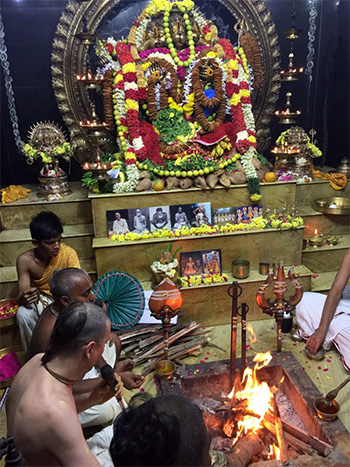Question: I have read some books written by gurus, etc. My question is if Hinduism says that the soul leaves the body at the time of death, why do we have rituals for the dead body and why there is still the practice of ancestor worship? Is it part of Hinduism?
Thank you for your questions.
Though the soul leaves the body at the time of death, sometimes due to tremendous attachment to one’s physical body, the soul will attempt to re-enter the dead body. It is very hard for materialistic people to give up their bodily attachments and possessions. As such, they sometimes remain around their dead body in the form of ghosts. A ghost is simply an individual who exists only in his subtle body (sukshma-sarira) composed of mind (manas), intelligence (buddhi), and identification (ahankara). The subtle body accompanies us even after the death of the physical body.
Thus in Hinduism the bodies of the dead are cremated to break any attachment that may remain for the soul after death. This allows the departed person to continue onwards on their path.
In the case of saints and realized souls, the bodies are not cremated at the time of death. They possess no material attachment to the external body, and thus there is no need for cremation. The bodies of such realized souls are burried in “samadhis”, or temples. And through these samadhis the realized saints help others on their path towards perfection.
As far as ancestor worship is concerned, it is an offering of thanks to one’s forefathers. If a person is extremely pious in life, they will attain a heavenly abode known as Pitruloka. In that abode, they enjoy according to the punya they accumulated in life. But they are offered a special bonus, and that is they receive additional punya from the offerings made by their descendents. Thus they can extend their stay within the realm of Pitruloka with the help of their descendants.
If one is very sinful, the ancestor worship will still benefit them, as the process involves worshipping Vishnu in Gaya. The remants (prasadam) of the offerings to Vishnu are offered to the forefather, and if that person is in a hellish existence they are freed from it. Also, if they happen to be existing as ghosts (due to suicide or untimely death), they will be delivered from that state and given a physical body. Thus the worship of the forefathers is actually worship of Vishnu for the benefit of the forefathers. It is an offering of thanks to one’s forefathers, for they have left us everything they possessed, given us our culture and teachings, and even gave us life.
For these reasons it is the duty of everyone to repay the debt to their forefathers by offering worship in Gaya. If that is not possible they may perform the worship where ever they are situated. But for one who is a devotee of Narayana, all benefits of the worship are automatically granted to the forefathers by Lord Hari’s mercy, and thus there is no necessity to perform the external rituals.
Receive our daily email newsletter on Hinduism, Yoga, Meditation, Ayurveda and Natural Healing.






